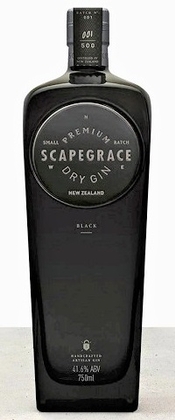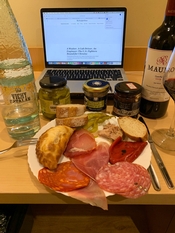|
|
 |
|
March 23, 2022
“Hello Darkness My Old Friend. This is the taste of Black Velvet profile. Unique. Complex. Unexpected.” So reads the introductory note attached to the bottle of Scapegrace Black Gin.  And it is all true—see for yourself with your first encounter with Scapegrace. The gin you’ve just poured into your glass is indeed black. The initial sip is smooth, fresh, and fruity, with cherry, peach, pineapple, red and blue berries and apple flavors, plus juniper, cloves, cinnamon and other savory spices. Rather than dominating the overall taste, that spice adds subtle depth and texture. You will also find immensely appealing floral notes here, with everything enveloped in a soft and silky texture. And unlike too many fancy gins this one is very recognizably gin—not some over-the-top perfumy collection of random scents. And it is all true—see for yourself with your first encounter with Scapegrace. The gin you’ve just poured into your glass is indeed black. The initial sip is smooth, fresh, and fruity, with cherry, peach, pineapple, red and blue berries and apple flavors, plus juniper, cloves, cinnamon and other savory spices. Rather than dominating the overall taste, that spice adds subtle depth and texture. You will also find immensely appealing floral notes here, with everything enveloped in a soft and silky texture. And unlike too many fancy gins this one is very recognizably gin—not some over-the-top perfumy collection of random scents.
Rather than savoring gin straight up, my own cocktail preference these days is—what to call it? Perhaps a restrained gin & tonic that focuses more on gin than on tonic. I add an ice cube and a sparse couple of inches of tonic to about two or three inches of gin. One reason I don’t add too much tonic is that I am generally turned off by the unpleasant sweetness in most American tonic water thanks to the presence of high fructose syrup in it, which I find unpleasant as well as unhealthy (compare, for example, Schweppes tonic in the USA versus the more savory Schweppes you get in Europe and you’ll see what I mean.)
But I digress. Let’s return to what is probably the most obvious question one asks about Scapegrace gin: what makes it black? The answer is berries, specifically Aronia berries. A plant native to North America and a member of the Rosaceae family, Aronia (also known as “chokecherry”) can now be found growing across the world, primarily in wet woodlands and swamps. From a horticulturist’s point of view, Aronia’s natural advantages include its resistance to drought, pests and disease. From a cocktail lover’s perspective, in addition to being wonderfully tasty, the gin seems like a bit of magic in the way it shifts from black to gray to rosy pink with the addition of tonic, or even just ice.
In various cultures Aronia berries have long been used in pies, muffins and juices. Recent studies have found that Aronia berries may have anti-cancer properties and other health benefits. They are also relatively high in vitamins and minerals. There does not appear to be any well-documented evidence of specific risks or hazards related to the consumption of Aronia although it’s always possible that some people may be allergic to it.
Aronia berries have long been used in places as diverse as Minnesota and Lithuania to make wine! I have never seen or tasted these wines myself, so I don’t know if it is black. But as I look out my window, I see that the sun seems to be setting. Perhaps it’s time to pour myself a black gin and tonic while I contemplate this issue further.
* * *
Scapegrace Black Gin, New Zealand Distilling Company. Importer: 375 Park Avenue Spirits, Louisville KY
Posted by Marguerite Thomas at 3:26 PM
|
|
March 16, 2022
Along with my colleagues at Wine Review Online, I’m delighted to welcome Roger Morris to our ranks. Roger is a widely traveled, highly skilled, broadly published wine writer who is well known to many of our contributors. Odds are that many of our regular readers will also have seen his by-line, as Roger contributes regularly to World of Fine Wine, Drinks Business, Wine & Spirits, Meininger’s, VinePair, Global Drinks Intel, Santé and The Drop…among others.
That’s quite a list of prestigious publications, and given the fact that many more people wish to write about wine than manage to do so, the list is attributable to the fact that Roger can really write—and takes great care to  know what he’s writing about. know what he’s writing about.
He’s been a full-time writer specializing in wine, food and travel for the past 20 years. Roger began writing about wine in 1979 for the late Washington Star, was the first wine columnist for USA Today and wrote features for Saveur it its early, high-flying days as a premier culinary publication.
His academic credentials are also impressive. Roger holds degrees from the University of Charleston (BA in Political Science) and the University of Illinois (the big one, in Urbana-Champagne; an MS in Communications). Not one to rest on his laurels, he resumed studies during the pandemic to complete an MA in Liberal Studies from the University of Delaware. He’s done his share of teaching as well as learning, having taught journalism and film criticism at Arizona State University.
Roger and his wife, Ella Morris, are natives of West Virginia but have lived in the Delaware region since 1973. From that base of operations, he worked at DuPont from 1973 to 1999 in corporate PR and pharmaceuticals marketing. Shifting to full-time writing around the turn of the millennium, he has made more than 100 reporting trips to wine regions, mostly in Europe and South America, during the first two decades of the current century.
I encourage you to check out Roger’s first column—running in this week’s issue of WRO—to get a sense the perspective he’s gained from all those trips to South America and his broader life experiences. Many tributaries can be seen contributing to Roger’s columns, and in turn, many insights will flow from them to our readers.
Roger…welcome aboard!
Posted by Michael Franz at 9:20 AM
|
|
March 10, 2022
Life always furnishes sufficient reason to complain, I suppose, but in a larger sense, complaining is quite unbecoming when other people are worse off. As someone who still works as a professor of Political Science, I can assure you that others are always worse, off—even setting aside times like the present (when a major democracy is being brutally invaded because a neighboring jackass tyrant covets it, but then decides to trash the place like a three-year-old in full tantrum mode when it refuses to simply capitulate).
But I digress, which all of you who are college grads know that professors are liable to do at any given moment. Back to my wine job.
I flew all night and day to reach Spain today, dealing with public health procedures and forms from three distinct nations (I connected through Germany), so this trip was not without its irksome elements while I was in transit. But no complaining. The process got me to Spain for the first time since Covid hit, and Spain is so marvelous in so many ways.
Spain’s possibilities are best appreciated after some seasoning, and I’m pretty well seasoned after 20+ trips here, including one during which I met my wife. I could definitely stand a lot more seasoning, and I look forward to becoming ever more experienced and comfortable here, but here’s a vignette that give you a sense of what I mean by “possibilities” here.
I’m a terrible sleeper under any conditions, so I arrived in Madrid at 3:30 local time today quite thoroughly trashed. But the airport was very efficient, and a very nice taxi driver whisked me to my hotel (in a business  district on the banks of a major freeway) quickly and for just 30 Euros…which seemed like a much better idea than trying to figure out the subway with my cerebral capacity running at about 10%. district on the banks of a major freeway) quickly and for just 30 Euros…which seemed like a much better idea than trying to figure out the subway with my cerebral capacity running at about 10%.
Knowing better than to even look at the bed (as I have an early appointment to be picked up by stellar winemaker Isaac Fernandez at 8 a.m. tomorrow), I set out on what I call a “Zombie Arrival Day” walk to secure provisions for the days ahead.
It bears repeating that I’m in a business district that is divided by a giant freeway and its tributaries, but no matter: This being Madrid, there are apartment buildings everywhere, and this being Madrid, the locals care deeply about what they eat.
You can see the results of my Zombie Arrival Day provisioning in the photo included here. Working almost exclusively with little neighborhood purveyors, I was easily able to cobble together the meal you behold in less than 45 minutes, thanks to a baker, a charcutier, (sorry that I only know the term in French), a couple of small grocers, a wine bar that sold me some local favorites for prices far below USA retail (plus their proprietary wine glasses, because the Spanish do NOT like to refuse customers, however outlandish the request), and a couple of utility shops that sold me an 85-cent corkscrew, a 95-cent dinner plate, and flatware in sets of three knives, forks and spoons for the Euro equivalent of 95-cents each.
Circling back to my opening theme, eating dinner in a generic hotel room while zonked out of one’s mind from sleep deprivation and jet lag--over a computer--is not anybody’s sense of a peak experience. But again, no complaining. The upshot of my afternoon is that there is almost no conceivable scenario in which you can’t eat well in Spain. The wines and foods of both France and Italy remain much more widely appreciated among Americans than those of Spain, but the truth is that Spain remains the most intensely food-loving nation in the Europe—and is arguably the single most fun place anywhere on the globe to eat and drink.
* * *
If you want to know anything about what’s on my 95-cent plate or in my glasses, just send me a message at michael@franzwine.com
Posted by Michael Franz at 3:30 PM
|
|
March 2, 2022
Along with my colleagues at Wine Review Online, I’m delighted to welcome Vince Simmon to our ranks. He’s starting up this week with a set of reviews, and you’ll find his recommendations virtually every Wednesday going forward on the WRO “Reviews” page.
I’ve enjoyed tasting with Vince many times over the past 4+ years, mostly through Capital Wine School. I was struck almost immediately by the intensity with which he encounters wines as he tastes them, and also by the flood of impressions he’s able to offer in reaction to them, based on his sharp palate and broad inventory of tasting experience. It was impossible not to notice that he seemed to be committing these impressions to writing while we were tasting, entering characters at top speed on his mobile device. But then, he could just as easily  have been sending texts to friends about the shortcomings of the dimwit who was leading the tastings, so I didn’t make too much of that. have been sending texts to friends about the shortcomings of the dimwit who was leading the tastings, so I didn’t make too much of that.
Until, that is, I learned that he was on his way to posting more than 11,000 reviews on Vivino—which was all I needed to know…to try to recruit him.
Vince has been studying wine one way or another for years, beginning with bottles brought back from the Rhône by his father, whose job involved a lot of time in Geneva. After his undergraduate studies at Carnegie Mellon University, he lived in both Italy and Portugal, and you can guess what he was enjoying with his dinners over those stretches.
He’s also traveled extensively (and vinously) in France, including in Bordeaux, Champagne, Beaujolais, and both the northern and southern Rhône. California too—in many different regions, plus Oregon as well as Washington, where he lived for a stretch in Seattle and came to know many of that state’s winemakers. He’s also done a good bit of tasting in the eastern USA, particularly in the Finger Lakes and Virginia. His education included an MBA in Environmental Policy from Maryhurst University, and on the wine side, he’s earned certification at Level 3 from WSET—and in short order.
WRO readers will learn that Vince is keenly interested in the world’s greatest wines, but every bit as intent on ferreting out the world’s best values. To paraphrase something he mentioned to me, he’s especially intent on finding wines that punch above their weight in price, and takes just as much pleasure in finding an over-achieving Portuguese white for $20 as in tasting a Burgundy with a triple-digit price tag.
Sounds like he’ll fit right in here on WRO. Vince is very talented and very hard-working, but with an excellent sense of humor and no sense of self-importance. Look for reviews over his by-line to learn if your taste aligns with his regarding wines you know yourself, and then follow his lead to new ones he’ll be scouting out for you — and for all of us!
Posted by Michael Franz at 8:52 PM
|
|
 |
|